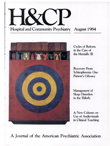An Outcome Study of an Inpatient Treatment Program for Pathological Gamblers
Abstract
In 1972 the Brecksville Unit of the Cleveland Veterans Administnation Medical Center began the first inpatient treatment program for pathological gambling in the United States. The 30-day, highly structured gambling treatment program aims for abstinence from gambling, reduction of the urge to gamble, and restonation of a maximum level of social functioning. The authors report the results of a preliminary outcome study of 60 former patients who completed a survey form rating various aspects of their lives one year postdischange. Fifty-five percent of the nespondents reported complete abstinence from gambling since dischange. Chi-square analyses demonstrated significant relationships between abstinence from gambling and improved interpensonal relationships, better financial status, decreased depression, and participation in professional aftercare and Gamblers Anonymous. The authors believe that their initial results support the contention that pathological gambling is a treatable disorder.
Access content
To read the fulltext, please use one of the options below to sign in or purchase access.- Personal login
- Institutional Login
- Sign in via OpenAthens
- Register for access
-
Please login/register if you wish to pair your device and check access availability.
Not a subscriber?
PsychiatryOnline subscription options offer access to the DSM-5 library, books, journals, CME, and patient resources. This all-in-one virtual library provides psychiatrists and mental health professionals with key resources for diagnosis, treatment, research, and professional development.
Need more help? PsychiatryOnline Customer Service may be reached by emailing [email protected] or by calling 800-368-5777 (in the U.S.) or 703-907-7322 (outside the U.S.).



